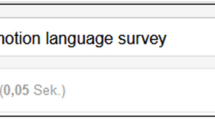Abstract
In this paper, we propose a system that can capture and assess users’ emotional status and provide support. The system includes a user profile database, an expert knowledge rule base, an education material database, and a portable emotion-sensing module. A user answers standardized questionnaires and visual analogue scales regarding to different emotions including depression, anxiety and stress, while recording daily activities and contextual factors leading to mood change through the portable emotion-sensing module in real time. The portable emotion-sensing module stores these variables in the cloud-based user profile database via Wi-Fi. The expert knowledge rule base in the cloud server receives values and distributing patterns of the variables to determine the corresponding mood symptoms and their severity. The educational material database, based on mindfulness-based cognitive therapy, returns guidance and encouragements to the portable emotion sensing module through the internet to provide the user with real-time support.
In the focus group testing, we invited twenty medical professionals and ten graduate school students to evaluate the system. Preliminary results showed that participants found the system helpful in achieving better awareness of their ever-changing emotional states, and that mindfulness-based audio guidance indeed helped them reduce stress and negative emotions. Subsequent pilot studies on patients with mild to moderate depression will help elucidate the clinical feasibility and efficacy of the proposed system.
Access this chapter
Tax calculation will be finalised at checkout
Purchases are for personal use only
Preview
Unable to display preview. Download preview PDF.
Similar content being viewed by others
References
World Health Organization. The global burden of disease (2004), http://www.who.int/healthinfo/global_burden_disease/2004_report_update/en/index.html (update 2004) (cited November 15, 2012)
Fu, T.S., Lee, C.S., Gunnell, D., Lee, W.C., Cheng, A.T.: Changing trends in the prevalence of common mental disorders in Taiwan: a 20-year repeated cross-sectional survey. Lancet. (2012)
Cartreine, J.A., Ahern, D.K., Locke, S.E.: A roadmap to computer-based psychotherapy in the United States. Harvard Review of Psychiatry 18(2), 80–95 (2010)
Cavanagh, K., Shapiro, D.A.: Computer treatment for common mental health problems. J. Clin. Psychol. 60(3), 239–251 (2004)
Foroushani, P.S., Schneider, J., Assareh, N.: Meta-review of the effectiveness of computerised CBT in treating depression. BMC Psychiatry 11, 131 (2011)
Morris, M.E., Kathawala, Q., Leen, T.K., Gorenstein, E.E., Guilak, F., Labhard, M., et al.: Mobile therapy: case study evaluations of a cell phone application for emotional self-awareness. Journal of Medical Internet Research 12(2), e10 (2010)
Depp, C.A., Mausbach, B., Granholm, E., Cardenas, V., Ben-Zeev, D., Patterson, T.L., et al.: Mobile interventions for severe mental illness: design and preliminary data from three approaches. The Journal of Nervous and Mental Disease 198(10), 715–721 (2010)
Beattie, A., Shaw, A., Kaur, S., Kessler, D.: Primary-care patients’ expectations and experiences of online cognitive behavioural therapy for depression: a qualitative study. Health expectations: An International Journal of Public Participation in Health Care and Health Policy 12(1), 45–59 (2009)
Torous, J., Friedman, R., Keshvan, M.: Smartphone Ownership and Interest in Mobile Applications to Monitor Symptoms of Mental Health Conditions. JMIR mhealth and uhealth 2, 1 (2014)
Zhong, E., et al.: User demographics prediction based on mobile data. In: Pervasive and Mobile Computing (2013)
Chittaranjan, G., Blom, J., Gatica-Perez, D.: Mining large-scale smartphone data for personality studies. In: Personal and Ubiquitous Computing (2011)
LiKamWa, R., et al.: MoodScope: Building a Mood Sensor from Smartphone Usage Patterns (2013)
Whittaker, R., et al.: A multimedia mobile phone based programme to prevent depression in adolescents (2011)
Whittaker, R., et al.: MEMO—A Mobile Phone Depression Prevention Intervention for Adolescents: Development Process and Postprogram Findings on Acceptability from a Randomized Controlled Trial. Journal of Medical Internet Research (2012)
Burns, et al., Harnessing Context Sensing to Develop a Mobile Intervention for Depression. Journal of Medical Internet Research 13(3) (2011)
Tan, G., T.K.D., Farmer, L., Sutherland, R.J., Gevirtz, R.: Heart Rate Variability (HRV) and Posttraumatic Stress Disorder (PTSD): A Pilot Study (2011)
Kuehl, L.K., Deuter, C., Richter, S.: Mental stress induced changes in high-frequency HRV can be explained by vagal withdrawal (2011)
Morris, M.E., et al.: Mobile Therapy: Case Study Evaluations of a Cell Phone Application for Emotional Self-Awareness. Journal of Medical Internet Research The Leading Peer-Reviewed eHealth Journal (2010)
Author information
Authors and Affiliations
Editor information
Editors and Affiliations
Rights and permissions
Copyright information
© 2014 Springer International Publishing Switzerland
About this paper
Cite this paper
Yang, PC., Chang, CC., Chen, YL., Chiang, JH., Hung, G.CL. (2014). Portable Assessment of Emotional Status and Support System. In: Zhang, Y., Yao, G., He, J., Wang, L., Smalheiser, N.R., Yin, X. (eds) Health Information Science. HIS 2014. Lecture Notes in Computer Science, vol 8423. Springer, Cham. https://doi.org/10.1007/978-3-319-06269-3_19
Download citation
DOI: https://doi.org/10.1007/978-3-319-06269-3_19
Publisher Name: Springer, Cham
Print ISBN: 978-3-319-06268-6
Online ISBN: 978-3-319-06269-3
eBook Packages: Computer ScienceComputer Science (R0)




